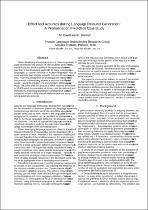 ResearchSpace
ResearchSpace
Effort and accuracy during language resource generation: a pronunciation prediction case study
JavaScript is disabled for your browser. Some features of this site may not work without it.
- ResearchSpace
- →
- Research Publications/Outputs
- →
- Conference Publications
- →
- View Item
| dc.contributor.author |
Davel, M

|
|
| dc.contributor.author |
Barnard, E

|
|
| dc.date.accessioned | 2007-07-02T13:18:06Z | |
| dc.date.available | 2007-07-02T13:18:06Z | |
| dc.date.issued | 2006-11 | |
| dc.identifier.citation | Davel, M and Barnard, E. 2006. Effort and accuracy during language resource generation: a pronunciation prediction case study. 17th Annual Symposium of the Pattern Recognition Association of South Africa, Parys, South Africa, 29 Nov - 1 Dec 2006, Pages: 4 | en |
| dc.identifier.uri | http://hdl.handle.net/10204/844 | |
| dc.description | This paper was later published in the SAIEE Africa Research Journal, Vol 98(4), pp 124-128 | |
| dc.description.abstract | When developing a language resource, there is generally a trade-off between the amount of effort invested in the resource creation process and the quality of the resulting resource. We (authors) argue that, in the developing world with its many resource-scarce languages, a ‘usable’ resource in multiple languages may be more valuable than a highly accurate resource for one language only. From this perspective we (the authors) investigate the resource validation process – determining whether a resource is sufficiently accurate– using the creation of a pronunciation dictionary as case study. We (the authors) show that the amount of effort required to validate a 20,000-word pronunciation dictionary can be reduced substantially by employing appropriate computational tools, when compared to both a fully manual validation process and a competing automatic process. | en |
| dc.language.iso | en | en |
| dc.subject | Language resources | en |
| dc.subject | Language technologies | en |
| dc.subject | Speech technologies | en |
| dc.subject | Dictionary validation | en |
| dc.title | Effort and accuracy during language resource generation: a pronunciation prediction case study | en |
| dc.type | Conference Presentation | en |
| dc.identifier.apacitation | Davel, M., & Barnard, E. (2006). Effort and accuracy during language resource generation: a pronunciation prediction case study. http://hdl.handle.net/10204/844 | en_ZA |
| dc.identifier.chicagocitation | Davel, M, and E Barnard. "Effort and accuracy during language resource generation: a pronunciation prediction case study." (2006): http://hdl.handle.net/10204/844 | en_ZA |
| dc.identifier.vancouvercitation | Davel M, Barnard E, Effort and accuracy during language resource generation: a pronunciation prediction case study; 2006. http://hdl.handle.net/10204/844 . | en_ZA |
| dc.identifier.ris | TY - Conference Presentation AU - Davel, M AU - Barnard, E AB - When developing a language resource, there is generally a trade-off between the amount of effort invested in the resource creation process and the quality of the resulting resource. We (authors) argue that, in the developing world with its many resource-scarce languages, a ‘usable’ resource in multiple languages may be more valuable than a highly accurate resource for one language only. From this perspective we (the authors) investigate the resource validation process – determining whether a resource is sufficiently accurate– using the creation of a pronunciation dictionary as case study. We (the authors) show that the amount of effort required to validate a 20,000-word pronunciation dictionary can be reduced substantially by employing appropriate computational tools, when compared to both a fully manual validation process and a competing automatic process. DA - 2006-11 DB - ResearchSpace DP - CSIR KW - Language resources KW - Language technologies KW - Speech technologies KW - Dictionary validation LK - https://researchspace.csir.co.za PY - 2006 T1 - Effort and accuracy during language resource generation: a pronunciation prediction case study TI - Effort and accuracy during language resource generation: a pronunciation prediction case study UR - http://hdl.handle.net/10204/844 ER - | en_ZA |





